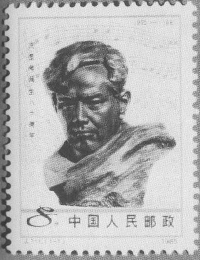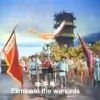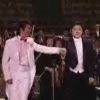
Illustration:
ill. 1.11
Date:
1985
Genre:
article of daily use, commodity, postage stamp, commemorative stamp
Material:
scan, paper, black-and-white; original source: postage stamp
Source:
Kraus 1989: Kraus, Richard Carl, Pianos and Politics in China: Middle-Class Ambitions and the Struggle over Western Music, New York: Oxford University Press, 1989: n.p.
Courtesy:
Oxford University Press New York
Inscription:
中国人民邮政 1985
Keywords:
commemorative stamp, everyday life, music, composer, national style, Beethoven, portrait, bourgeois, masses, workers, peasants, cadres, New Chinese Music, Cultural Revolution, Yellow River Canata, Western heritage
Xian Xinghai as Chinese Beethoven (Xian Xinghai 冼星海)
Xian Xinghai 冼星海 (1905–45), hailed as the “People’s Composer” (人民作曲家 Renmin Zuoqujia) after his untimely death in Moscow, had grown up among the fishermen of Guangdong province and had later studied some music in Paris. With his “lowly” class background combined with some formal training, he was idealized as being able to synthesize in his music the sentiments of both the (bourgeois) intellectuals and the masses of workers and peasants. This made him an ideal teacher at the Lu Xun Academy in Yan’an, where he taught the young cadres how to compose songs and organize or conduct choral groups (Chen 1995, 19–20). His own skills at orchestration are debated, but he allegedly wrote the Production Movement Cantata (生产运动大合唱 Shengchan yundong dahechang) and a theatrical entitled The Soldiers Advance (军民进行曲 Junmin jinxingqu). His most famous composition is the anti-Japanese Yellow River Cantata (黄河大合唱 Huanghe dahechang), written in 1939 (mus. 1.2a, mus. 1.2b, mus. 1.2c). All of these pieces are fine examples of what I would call “pentatonic romanticism.”
Foreign critics have contended until rather recently that compositions in the style of pentatonic romanticism were “inferior” music (one Chinese scholar now residing in the United States even called them “trash music” (垃圾音乐 laji yinyue) (Han 1981, 138–45). They held that such music was derivative and anachronistic, that it proved that the Chinese were not interested in adapting to twentieth-century musical conventions, that they would not produce anything that could be called “New Music,” and that “they appeared content to copy from the masters of the past” (Mackerras 1981; Mittler 1997, 11–12).
This commemorative stamp celebrating the eightieth birthday of Xian Xinghai in 1985 may be considered an ambiguous statement in this regard, pointing to the perpetual dilemma present in New Chinese Music, a dilemma that incites continuing discussions on “national style” of which the Cultural Revolution model works were one important part. On this stamp, Xian Xinghai is portrayed with stylized hair and deep eyes, as a Chinese Beethoven, a point substantiated by frequent comparisons even in scholarly writings that talk of the Yellow River Cantata as the Eastern equivalent of Beethoven’s Ninth (Choral) Symphony (Chen 1995, 20). This ascription may well be interpreted in two contradictory ways, epitomizing the very question New Chinese Music constantly ruminates: either Xian Xinghai is just as great a composer as Beethoven, or Xian is but a Chinese copy (or imitator) of Beethoven.





















